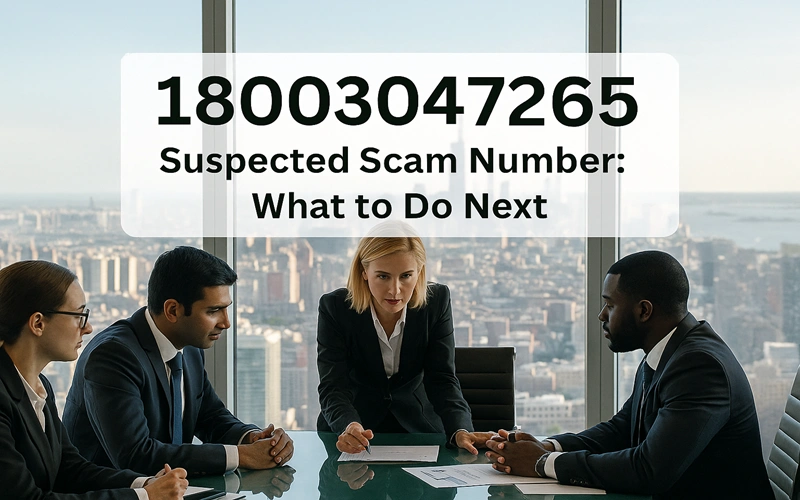Introduction: Understanding the Mystery of 18003047265
Have you ever glanced at your phone and noticed the number 18003047265 lighting up the screen? At first, it might seem like just another call, but something feels off. Maybe the caller sounded urgent, claiming to be from a big company, or perhaps they offered to fix a problem you didn’t even know you had. This toll-free number, starting with 1-800, has been flagged by many as suspicious, often linked to scams that try to trick people into sharing money or personal details. Scams like these are sneaky, and they can catch anyone off guard, even if you’re careful. In this article, we’ll break down everything about 18003047265 in a way that’s easy to understand, We’ll explore what phone scams are, why this number is raising red flags, how to check if a call is real, and steps to stay safe. By the end, you’ll know exactly what to do if this number—or any strange one—calls you.
What Are Phone Scams? A Kid-Friendly Explanation
How Scammers Use Numbers Like 18003047265
Imagine a phone scam like a wolf in sheep’s clothing—it looks harmless but isn’t. Scammers use numbers like 18003047265 to call lots of people, hoping a few will fall for their tricks. They might say, “Your computer is hacked!” or “You owe taxes and could go to jail!” to scare you into acting fast. These calls often come from robo-dialers, which are machines that automatically dial thousands of numbers. If you answer, you might hear a recording or a real person who sounds convincing. They could have a friendly voice or even know your name, which makes it seem real. But it’s all part of the trick.
Read More: 6136162822
Why Scammers Keep Calling
Scammers don’t give up easily. They buy lists of phone numbers from shady websites or get them from data breaches, where hackers steal information from companies. In 2024, over 2.6 million Americans reported scam calls to the Federal Trade Commission (FTC), losing billions of dollars. That’s like filling a stadium with people who got tricked! Numbers like 18003047265 keep popping up because scammers can change numbers or spoof them to avoid getting caught. They often call from other countries, making it hard for police to track them. But the more we learn about their tricks, the harder it is for them to win.
Real Stories: What People Say About 18003047265
Online Reports and Community Warnings
If you search 18003047265 online, you’ll find tons of stories on websites like 800Notes.com, WhoCalled.us, or Truecaller. People share their experiences to warn others, and this number has a bad reputation. For example, one person in Texas said they got a call from 18003047265 claiming their computer was infected. The caller asked for $200 to “fix” it, but they hung up and checked online, finding out it was a scam. Another user in Florida reported the caller pretended to be from the IRS, saying they owed $1,000 and had to pay with gift cards. These stories show how scammers use the same number for different tricks.
Not every call from 18003047265 is guaranteed to be a scam. Sometimes, numbers get reused by real companies or spoofed by mistake. But most reports point to fraud. On community forums, users rate this number as “scam likely,” and apps like Nomorobo flag it automatically. One woman shared that she almost lost $500 because the caller sounded so professional, with office noises in the background. Luckily, she called her bank in time to stop the payment. Sharing these stories helps everyone stay alert, so if you get a call, check online first.
The Power of Sharing Experiences
When people post about 18003047265, it’s like putting up a warning sign for the whole neighborhood. The more we share, the fewer people get tricked. Some websites let you vote on whether a number is safe, and this one gets low scores. In 2023, scam calls cost Americans over $10 billion, according to the FTC. By reporting calls, you help agencies track patterns and sometimes catch scammers. It’s like being a superhero for your community!
How to Spot a Scam Call from 18003047265
Red Flags to Watch For
Spotting a scam is like solving a puzzle—look for clues that don’t add up. Here are some red flags for calls from 18003047265:
-
Urgency: They say, “Act now or you’re in trouble!” to make you panic.
-
Strange Requests: Asking for gift cards, wire transfers, or your passwords.
-
Unknown Caller: You didn’t expect the call, and they won’t say who they are.
-
Threats: Saying you’ll be arrested or lose your account if you don’t pay.
-
Too Good to Be True: Promising free money or prizes you didn’t enter for.
If any of these happen, hang up. Real companies don’t act like this. For example, the IRS never calls to demand instant payment—they send letters. Microsoft won’t call about your computer unless you contacted them first.
Checking If It’s Real
To verify a call from 18003047265, follow these steps:
-
Don’t Call Back the Number They Give: Look up the official number on the company’s website, like microsoft.com or irs.gov, and call that instead.
-
Search Online: Type “18003047265 scam” into Google to see what others say.
-
Use Your Phone’s Tools: Block the number on your phone. On iPhones, go to Recent Calls, tap the “i” next to the number, and select “Block this Caller.” Android has similar options.
-
Ask an Adult: If you’re a kid, tell a parent or guardian to help check.
Apps like Truecaller or RoboKiller can also identify spam calls. They use community data to warn you before you answer. If the call seems fishy, trust your gut and hang up.
Table: Types of Scams Linked to 18003047265
Here’s a table to help you understand the scams tied to this number and how to spot them:
|
Scam Type |
What They Say |
Red Flags |
What to Do |
|---|---|---|---|
|
Tech Support |
“Your computer has a virus. Pay us to fix it.” |
Asks for remote access or payment upfront |
Hang up, run antivirus, call official support |
|
IRS/Government |
“You owe taxes. Pay now or face arrest.” |
Threats, demands gift cards |
Verify with official IRS number (800-829-1040) |
|
Prize or Lottery |
“You won a prize! Send fees to claim it.” |
You didn’t enter, asks for money first |
Ignore and report to FTC |
|
Bank or Credit Card |
“Your account is hacked. Share your PIN.” |
Asks for sensitive info like passwords |
Call your bank using the number on your card |
|
Charity Scam |
“Donate to help disaster victims.” |
High pressure, vague details |
Check charity on give.org before donating |
This table makes it easy to spot patterns and act fast. Keep it handy for any suspicious call!
What to Do If You’ve Been Scammed
Steps to Recover and Protect Yourself
If you answered a call from 18003047265 and gave out money or info, don’t feel embarrassed—it happens to lots of people. Here’s what to do:
-
Contact Your Bank: If you sent money, call your bank right away. They might stop the payment or refund you. For gift cards, call the company on the card’s back.
-
Freeze Your Credit: If you shared personal info, contact Equifax, Experian, and TransUnion to freeze your credit. It’s free and stops scammers from opening accounts in your name.
-
Change Passwords: Update passwords for your email, bank, and other accounts. Use strong ones like “SunnyHill2025!” and enable two-factor authentication (2FA).
-
Report the Scam: Tell the FTC at ftc.gov/complaint or call 1-877-FTC-HELP. Report to the FBI at ic3.gov for bigger cases. Local police can help too.
-
Warn Others: Share your story on sites like 800Notes to alert people.
For example, one man in Ohio gave scammers his credit card number after a call from 18003047265. He called his bank within an hour, and they canceled the charges. Quick action saved him $1,000. If you’re upset, talk to a friend or counselor. Groups like AARP offer free scam recovery tips.
Preventing Future Scams: Your Safety Toolkit
Building Strong Defenses
Stopping scams before they start is the best plan. Here’s how to protect yourself from 18003047265 and other numbers:
-
Don’t Answer Unknown Calls: Let them go to voicemail. Real callers leave messages.
-
Use Blocking Apps: Apps like Nomorobo or Hiya label spam calls and block them.
-
Install Antivirus: Protect your phone and computer from malware scammers might send.
-
Join the Do Not Call List: Sign up at donotcall.gov to reduce sales calls (scammers might still try).
-
Educate Your Family: Teach kids and grandparents about scam signs. Kids, always tell an adult about weird calls.
Phone carriers like AT&T or Verizon offer scam-blocking services, sometimes for a small fee. Free apps work too. Never click links in texts or emails from unknown numbers—they could install bad software.
Staying Informed
Scams change fast. In 2025, some scammers use AI to mimic voices, like pretending to be your mom saying she’s in trouble. Always verify by calling back on a known number. Follow the FTC on social media or check their website for new scam alerts. Joining local groups or online forums also keeps you updated.
The Bigger Impact: Why Scams Hurt Everyone
How Scams Affect Society
Scams like those tied to 18003047265 aren’t just personal problems—they hurt communities. In 2024, Americans lost over $10 billion to phone scams, money that could’ve helped schools, hospitals, or families. Scammers often target vulnerable people, like seniors or non-English speakers, which makes it extra unfair.
Governments fight back with laws like the Telephone Consumer Protection Act, which fines illegal robo-calls. Tech companies build better spam filters, and phone apps improve detection. Globally, police teams work together to shut down scam call centers in places like India or Nigeria. You can help by reporting calls and spreading the word.
Conclusion: Take Control and Stay Safe
Calls from 18003047265 can be scary, but you’re stronger than the scammers. By spotting red flags, checking facts, and reporting suspicious calls, you protect yourself and others. Use tools like blocking apps and the Do Not Call list, and share what you learn with friends and family. Knowledge is power, and together, we can make it harder for scammers to win. Stay curious, stay safe, and never let a strange number trick you!
FAQ Section: Your Questions Answered
Q1: What is 18003047265, and why is it suspicious?
A: 18003047265 is a toll-free number reported by many as part of scams like tech support or IRS fraud. It’s suspicious because of user complaints about unsolicited, pushy calls.
Q2: Should I pick up calls from 18003047265?
A: No, let it go to voicemail. If it’s real, they’ll leave a message. Search the number online to see if others report it as a scam.
Q3: What if I already shared info with the caller?
A: Act fast: call your bank, freeze your credit, change passwords, and report to ftc.gov/complaint. Quick steps can limit damage.
Q4: How do I block this number?
A: On your phone, go to recent calls, select the number, and choose “Block.” Use apps like Truecaller for extra protection.
Q5: How can I stop getting scam calls?
A: Sign up for the Do Not Call list, use spam-blocking apps, and never share info with unknown callers. Tell family about scam signs.
Read More: 8333226760


